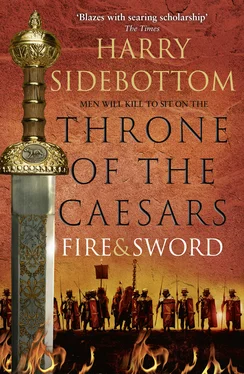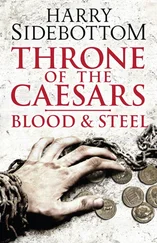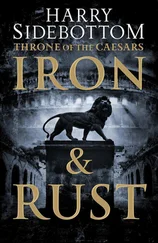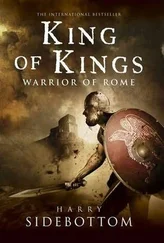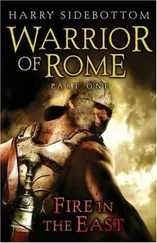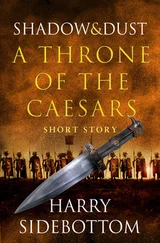As presiding magistrate Licinius called on the Conscript Fathers to give their advice.
In the nervous silence, Pupienus turned the ring on the middle finger of his right hand, the ring containing the poison.
To the relief of all, Gallicanus sought permission to address the meeting.
Pupienus regarded the speaker with disfavour. A tangle of unwashed hair and beard, a homespun toga, no tunic, bare feet; an ostentatious parade of self-proclaimed antique virtue. All it needed was a staff and a wallet for alms, and he would have been Diogenes reborn. Pupienus thought Cynic philosophers were meant to abstain from politics; certainly they should not possess the property qualification of a Senator. He trusted his distaste did not show on his face.
‘A tyrant is descending upon us. A monster stained with innocent blood. Conscript Fathers, we must recover our ancestral courage.’
All true enough, although Pupienus considered that more than rhetoric was needed. Specific proposals were required at this desperate pass. The Senate hated Maximinus for killing their friends and relatives, for the continual exactions to pay for the unwinnable northern wars. They loathed him for the lack of respect shown to their order. Since his elevation, he had never set foot in the Curia, or even visited Rome. Ultimately they despised him for not being one of them. When news came of the revolt of the Gordiani in Africa, it had seemed a gods-given salvation. The Senate had voted them the purple, had denied Maximinus and his son fire and water, had declared them enemies of Rome. The Senate had acted hastily. It had gambled, and it had lost. There was nothing for it now but to gamble again. One last throw of the dice: elect a new Emperor.
‘A ravening tyrant is coming from the savage North. We must defend our families, our homes, the temples of our gods. We must stand in the ranks ourselves. To elect another tyrant in the hope that he will defend us from the one already approaching is insanity.’
The words irritated Pupienus. No candidate had yet been nominated. It was too early for personal invective. Unless … surely Gallicanus was not going to propose the mad scheme he had aired in Pupienus’ house three years earlier, when the news had come that the Emperor Alexander had been murdered?
‘Place a man above the laws, and he will become lawless. Power corrupts. Even should a man be found with the virtue to resist temptation, a man who would rule for others not himself, history has shown that the heirs to his position will be tyrants, ruling for their own perverse pleasure.’
The small philosophic coterie led by Gallicanus’ especial friend Maecenas shook back the threadbare folds of their togas and applauded. The majority of the Senators, all better apparelled, sat in silence.
‘I am not suggesting anything new, anything foreign. The gods forbid we should institute a radical democracy. The Athenian past demonstrates how quickly such a constitution slides into mob rule. I do not even propose we Senators take power, rule as an aristocracy. Every such state inevitably has been deformed into an oligarchy, where a few rich men trample down their fellow citizens. No, I argue we should return to our ancestral government. Rome became great under a free Republic. Every order of men knew their duties and their place. The Consuls embodied the monarchic element, the Senate the aristocratic, the assemblies of the people the democratic. All was balanced in harmony. As a Republic, Rome defeated Hannibal. As a Republic, Rome will defeat Maximinus. We have already elected a board of twenty men to prosecute the war. We have no need of an Emperor, no need to set the boots of an autocrat over our heads. Conscript Fathers, we need do nothing to restore the Republic. The providence of the gods who watch over Rome has made the Republic live again. Let us seize our liberty! Let libertas be our watchword!’
Gallicanus, archaic probity personified, glared defiance at the unmoved togate benches. Maecenas came forward, and put his arm around the shoulders of his amicus , said something soft in his ear. Gallicanus smiled, no longer a barking Cynic dog, but, despite his more than forty years, an unsure youth seeking approbation.
Pupienus was mildly surprised when Fulvius Pius took the floor. Inoffensiveness, not ability, had seen Pius rise to the Consulship then the Board of Twenty. His career had been marked by neither independence of thought or action, nor much display of courage.
‘Fine words for a lesson in philosophy, fine words to address two or three pupils. Utterly inappropriate to this august house.’
Since his election to the Twenty, not only had a certain initiative surfaced in Pius, but an unexpected asperity.
‘I will not enter into a philosophical dialogue with Gallicanus. This is not the time or place to debate the tenets of the schools. Instead we should face realities. No one regrets the passing of the free Republic more keenly than me. The busts of Cato, Brutus and Cassius have pride of place in my house. But the free Republic is nothing more than a pleasant memory. If we could not see that for ourselves, long ago the historian Tacitus taught us that the rule of an Emperor and the continuance of our empire are inextricably linked.’
Still locked in an embrace, Gallicanus and Maecenas glowered at the speaker.
‘Only a handful of men, beguiled by the high-sounding words of philosophy, want the return of the long dead Republic. The majority of all orders desire the status quo. The provincials can appeal to the Emperor against unjust decisions of their governors. The plebs urbana look to the Emperor to give them the sustenance of life, and the spectacles that make it worth living. The soldiers receive their pay from the Emperor, and give him their oath. What of the Praetorians? Their sole reason for existence is to guard the Emperor. And what of us, Conscript Fathers? With no Emperor to restrain them, the ambitions of certain Senators would again tear the Republic apart. A welter of civil strife would consume our armies. The barbarians would pour over the frontiers, sack our cities, drown our dominion in blood.’
‘Not if we return to the ways of our ancestors,’ Gallicanus shouted.
Pius smiled, as if patiently correcting a schoolboy. ‘The mos maiorum was no defence against Caesar or Augustus. We do not live in Plato’s Republic. Let us face facts as statesmen. We must have an Emperor to lead our defence. The fate of the Gordiani shows that the man elected must command legions. As the armies in the North are with Maximinus, let us send the purple to a governor of one of the great provinces in the East, begging him to march with all haste to save Rome.’
Gallicanus bellowed defiance. ‘Cowardice! The gods may never grant us another opportunity for libertas !’
Amidst an outcry of disapproval – Sit down! Leave the floor! – Maecenas pulled his friend back to his seat.
‘Conscript Fathers.’ Licinius struggled to be heard over the clamour. ‘Senators of Rome!’
Eventually the house heeded the Consul.
‘Conscript Fathers, the distinguished Consular Fulvius Pius has given us good advice. In all but one respect. The very practicalities he urges mitigate against the election of an eastern governor. Their allegiance is unknown. Indeed the governor of Cappadocia, Catius Clemens, was one of the men who put Maximinus on the throne.’
Pupienus was not alone in looking at Clemens’ younger brother. Catius Celer sat modestly a few rows back, among the ex-Praetors and other Senators who had not yet been Consul. His face betrayed nothing. He had been quick to acknowledge the Gordiani. Many great houses had the foresight to survive times of troubles by having relatives on both sides.
Читать дальше
